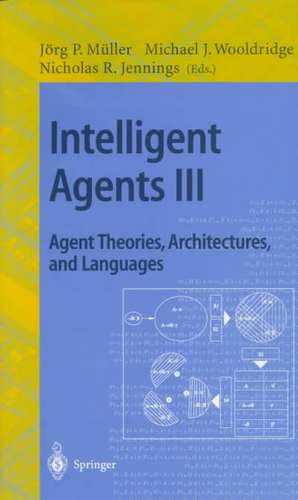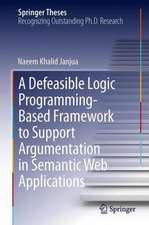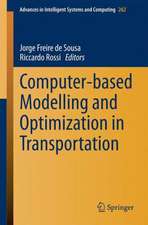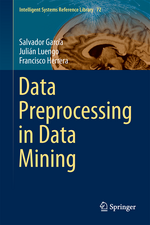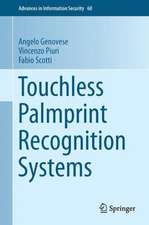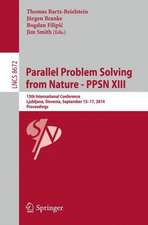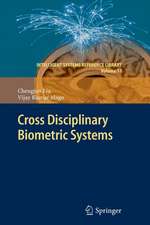Intelligent Agents III. Agent Theories, Architectures, and Languages: ECAI'96 Workshop (ATAL), Budapest, Hungary, August 12-13, 1996, Proceedings: Lecture Notes in Computer Science, cartea 1193
Editat de Jörg Müller, Michael J. Wooldridge, Nicholas R. Jenningsen Limba Engleză Paperback – 22 ian 1997
This book, the third in a series, represents the state of the art in the science of agent systems. It is based on papers presented at the 3rd workshop on Agent Theories, Architectures and Languages (ATAL'96), held in conjunction with the European Conference on Artificial Intelligence (ECAI'96) in Budapest, Hungary, in August 1996. It is essential reading for anyone interested in this vital new technology.
Din seria Lecture Notes in Computer Science
- 20%
 Preț: 1061.55 lei
Preț: 1061.55 lei - 20%
 Preț: 307.71 lei
Preț: 307.71 lei - 20%
 Preț: 438.69 lei
Preț: 438.69 lei - 20%
 Preț: 645.28 lei
Preț: 645.28 lei -
 Preț: 410.88 lei
Preț: 410.88 lei - 15%
 Preț: 580.46 lei
Preț: 580.46 lei - 17%
 Preț: 427.22 lei
Preț: 427.22 lei - 20%
 Preț: 596.46 lei
Preț: 596.46 lei -
 Preț: 381.21 lei
Preț: 381.21 lei - 20%
 Preț: 353.50 lei
Preț: 353.50 lei - 20%
 Preț: 1414.79 lei
Preț: 1414.79 lei - 20%
 Preț: 309.90 lei
Preț: 309.90 lei - 20%
 Preț: 583.40 lei
Preț: 583.40 lei - 20%
 Preț: 1075.26 lei
Preț: 1075.26 lei - 20%
 Preț: 310.26 lei
Preț: 310.26 lei - 20%
 Preț: 655.02 lei
Preț: 655.02 lei - 20%
 Preț: 580.93 lei
Preț: 580.93 lei - 20%
 Preț: 340.32 lei
Preț: 340.32 lei - 15%
 Preț: 438.59 lei
Preț: 438.59 lei - 20%
 Preț: 591.51 lei
Preț: 591.51 lei - 20%
 Preț: 649.49 lei
Preț: 649.49 lei - 20%
 Preț: 337.00 lei
Preț: 337.00 lei -
 Preț: 449.57 lei
Preț: 449.57 lei - 20%
 Preț: 607.39 lei
Preț: 607.39 lei - 20%
 Preț: 1024.44 lei
Preț: 1024.44 lei - 20%
 Preț: 579.30 lei
Preț: 579.30 lei - 20%
 Preț: 763.23 lei
Preț: 763.23 lei - 20%
 Preț: 453.32 lei
Preț: 453.32 lei - 20%
 Preț: 575.48 lei
Preț: 575.48 lei - 20%
 Preț: 585.88 lei
Preț: 585.88 lei - 20%
 Preț: 825.93 lei
Preț: 825.93 lei - 20%
 Preț: 763.23 lei
Preț: 763.23 lei - 17%
 Preț: 360.19 lei
Preț: 360.19 lei - 20%
 Preț: 1183.14 lei
Preț: 1183.14 lei - 20%
 Preț: 340.32 lei
Preț: 340.32 lei - 20%
 Preț: 504.57 lei
Preț: 504.57 lei - 20%
 Preț: 369.12 lei
Preț: 369.12 lei - 20%
 Preț: 583.40 lei
Preț: 583.40 lei - 20%
 Preț: 343.62 lei
Preț: 343.62 lei - 20%
 Preț: 350.21 lei
Preț: 350.21 lei - 20%
 Preț: 764.89 lei
Preț: 764.89 lei - 20%
 Preț: 583.40 lei
Preț: 583.40 lei -
 Preț: 389.48 lei
Preț: 389.48 lei - 20%
 Preț: 341.95 lei
Preț: 341.95 lei - 20%
 Preț: 238.01 lei
Preț: 238.01 lei - 20%
 Preț: 538.29 lei
Preț: 538.29 lei
Preț: 338.81 lei
Preț vechi: 423.52 lei
-20% Nou
Puncte Express: 508
Preț estimativ în valută:
64.83€ • 67.86$ • 53.96£
64.83€ • 67.86$ • 53.96£
Carte tipărită la comandă
Livrare economică 31 martie-14 aprilie
Preluare comenzi: 021 569.72.76
Specificații
ISBN-13: 9783540625070
ISBN-10: 3540625070
Pagini: 428
Ilustrații: XV, 408 p.
Dimensiuni: 155 x 235 x 22 mm
Greutate: 0.59 kg
Ediția:1997
Editura: Springer Berlin, Heidelberg
Colecția Springer
Seriile Lecture Notes in Computer Science, Lecture Notes in Artificial Intelligence
Locul publicării:Berlin, Heidelberg, Germany
ISBN-10: 3540625070
Pagini: 428
Ilustrații: XV, 408 p.
Dimensiuni: 155 x 235 x 22 mm
Greutate: 0.59 kg
Ediția:1997
Editura: Springer Berlin, Heidelberg
Colecția Springer
Seriile Lecture Notes in Computer Science, Lecture Notes in Artificial Intelligence
Locul publicării:Berlin, Heidelberg, Germany
Public țintă
ResearchCuprins
Modelling and design of multi-agent systems.- Is It an agent, or just a program?: A taxonomy for autonomous agents.- To be or not to be an “agent”.- What Is an agent?.- An agent is an individual that has consciousness.- Agents as a Rorschach test: A response to Franklin and Graesser.- From agent theory to agent construction: A case study.- If Z is the answer, what could the question possibly be?.- Practical theory and theory-based practice.- QLB: A quantified logic for belief.- Dynamic belief analysis.- Belief revision through the belief-function formalism in a multi-agent environment.- Formal specification of beliefs in multi-agent systems.- Reasoning about collective goals.- Formalisation of a cooperation model based on joint intentions.- A reactive-deliberative model of dialogue agency.- Towards layered dialogical agents.- A rational agent as the kernel of a cooperative spoken dialogue system: Implementing a logical theory of interaction.- Modelling social agents: Communication as action.- The threshold of cooperation among adaptive agents: Pavlov and the Stag Hunt.- How can an agent learn to negotiate?.- A cooperation model for autonomous agents.- Designing and implementing a multi-agent architecture for business process management.- Emotion-based attention shift in autonomous agents.- A deliberative and reactive diagnosis agent based on logic programming.- Reactive and motivational agents: Towards a collective minder.- A multi language environment to develop multi agent applications.- The design of a coordination language for multi-agent systems.- A knowledge-theoretic semantics for concurrent MetateM.- Knowledge-based situated agents among us a preliminary report.
